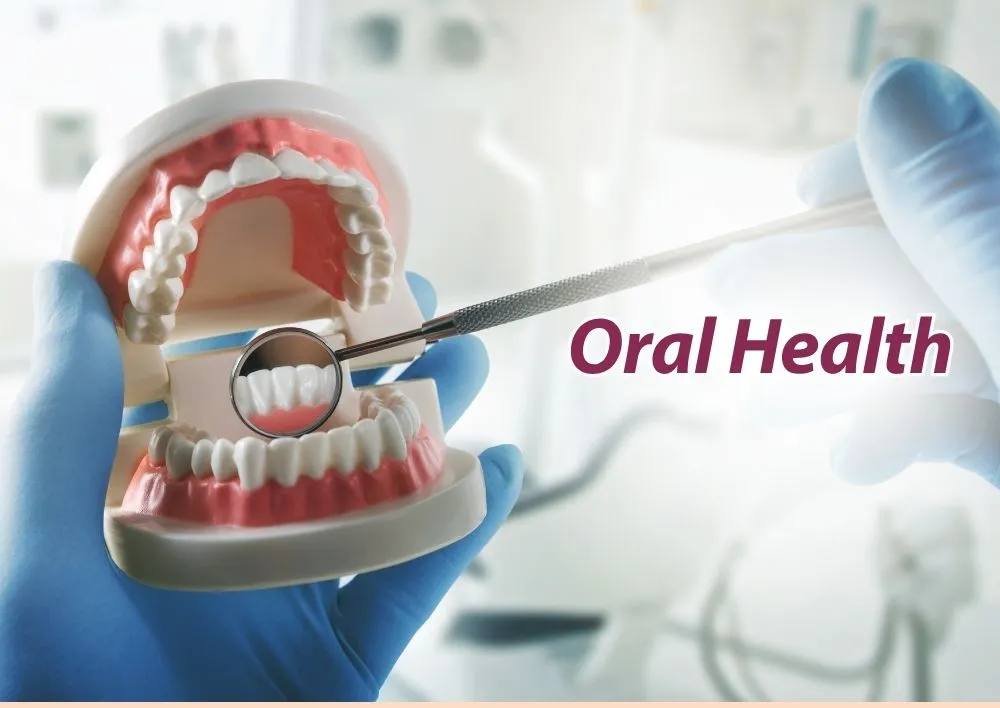8 Common Health Conditions You Can Detect Through Your Oral Health
Summary
Your mouth is more than just a gateway for food; it is a window into your overall health. Many people don’t realize that the condition of their teeth and gums can reveal early signs of health problems affecting the rest of the body. From diabetes to heart disease, your oral health can say a lot about what is happening inside you.
Here are 8 common health problems that often show up in your teeth and gums, and what they could mean for your overall well-being.
1. Diabetes
If you have frequent gum infections, swollen gums, or slow-healing mouth sores, it might be a sign of diabetes. High blood sugar levels make it harder for your body to fight bacteria, increasing your risk of gum disease (periodontitis) and affecting your overall oral health.
People with diabetes are more likely to experience:
-
Bleeding gums while brushing or flossing
-
Persistent bad breath
-
Loose teeth or gum recession
Dr. Vishwas Bhatia, Dentist in Gurgaon at Dental Check-Up, explains,
"Diabetes and oral health are closely linked. Uncontrolled blood sugar levels can make your gums more prone to infection and slow down healing after dental procedures. Regular dental visits and good sugar management play a key role in preventing severe gum problems."
Tip: Regular dental check-ups, maintaining good blood sugar control, and taking care of your health can prevent gum infections from worsening.
2. Heart Disease
Bleeding or inflamed gums can sometimes indicate a higher risk of heart disease. Studies suggest that the same bacteria causing gum inflammation may enter the bloodstream and contribute to artery blockage, increasing the chances of heart attack or stroke.
Warning signs include:
-
Puffy, red gums
-
Chronic gum bleeding
-
Unexplained mouth pain
People with gum disease are nearly twice as likely to develop heart-related problems compared to those with healthy gums.
3. Osteoporosis
Your teeth are supported by your jawbone, and if that bone becomes weak, it can lead to loose teeth or tooth loss. Osteoporosis, a condition that weakens bones, can affect your jawbone too.
Symptoms may include:
-
Receding gums
-
Loose or shifting teeth
-
Ill-fitting dentures
If your dentist notices bone loss in your jaw during an X-ray, it might be an early sign of osteoporosis. Early detection can help you get the treatment you need to protect your bones.
4. Vitamin Deficiencies
Your gums can reveal whether your body is getting enough nutrients. A lack of vitamin C can cause swollen gum or bleeding gums, while a vitamin D deficiency can lead to weak teeth and jawbone problems.
Watch for:
-
Gum bleeding even with gentle brushing
-
Mouth ulcers or soreness
-
Slow healing after dental procedures
Tip: A diet rich in fresh fruits, leafy greens, and dairy products supports strong teeth and gums.
5. Stress and Anxiety
Ever noticed that you clench or grind your teeth when you are stressed? This habit, known as bruxism, can lead to worn-down teeth, jaw pain, and even headaches.
Signs you might be grinding your teeth include:
-
Flat or chipped teeth
-
Jaw soreness in the morning
-
Sensitive teeth
Stress can also reduce saliva flow, causing dry mouth, which increases the risk of cavities. Managing stress through exercise, relaxation techniques, or counseling can help protect your oral health.
6. Acid Reflux (GERD)
If stomach acid frequently flows back into your mouth, it can erode your tooth enamel, especially on the back teeth. Over time, this can cause tooth sensitivity, discoloration, and even cavities.
Common oral signs of GERD include:
-
Thinning or yellowing enamel
-
Bitter taste in the mouth
-
Bad breath
If your dentist suspects acid reflux damage, they may recommend seeing a gastroenterologist for evaluation and treatment.
7. Eating Disorders
Conditions like bulimia and anorexia can leave visible signs in your mouth. Frequent vomiting exposes your teeth to stomach acid, leading to enamel erosion, sensitivity, and discoloration. Additionally, poor nutrition weakens the gums and increases infection risk.
Oral symptoms to look out for:
-
Transparent-looking teeth
-
Dry mouth
-
Swollen salivary glands
Dentists can often be the first to spot signs of eating disorders, making early intervention possible.
8. Autoimmune Diseases
Certain autoimmune diseases, such as Sjogren’s syndrome or lupus, can cause mouth dryness, ulcers, and gum inflammation. Sjogren’s, for instance, attacks the glands that produce saliva, leading to chronic dry mouth and an increased risk of tooth decay.
Common symptoms include:
-
Dry or sticky mouth
-
Cracked lips
-
Difficulty swallowing or speaking
Your dentist may recommend artificial saliva products or refer you to a specialist for further testing.
Why Does a Regular Dental Check-Up Matter?
Your dentist does more than clean your teeth; they can detect early signs of systemic diseases long before other symptoms appear. Regular dental visits help ensure that problems in your mouth don’t go unnoticed or untreated.
Here is how to protect your oral and overall health:
-
Brush and floss daily
-
Schedule dental check-ups every six months
-
Eat a well-balanced diet rich in vitamins and minerals
-
Avoid tobacco and limit sugary foods
-
Stay hydrated to maintain saliva flow
Conclusion:
Your teeth and gums can reveal important clues about your health. Paying attention to changes like gum bleeding, loose teeth, or persistent bad breath can help catch hidden health issues early. If you notice any unusual symptoms in your mouth, don’t ignore them. Visit a dentist near you to get a professional evaluation and protect your dental health. A healthy mouth is often the first step toward a healthier you!
Frequently Asked Questions
Conditions like diabetes, vitamin deficiencies, infections, anemia, and certain digestive or immune disorders can show early signs in the mouth.
Yes, many systemic diseases, around 90%, can show symptoms in the mouth, such as ulcers, gum changes, or dry mouth.
A dentist can spot signs related to heart health, such as gum inflammation or infections, which are associated with cardiovascular problems.
The circulatory and immune systems are closely linked to oral health because mouth infections can enter the bloodstream and affect overall health.
Autoimmune conditions like Sjögren’s syndrome, lupus, and pemphigus vulgaris commonly affect the mouth, causing dryness, ulcers, and inflammation.















Was the information useful?
0 0